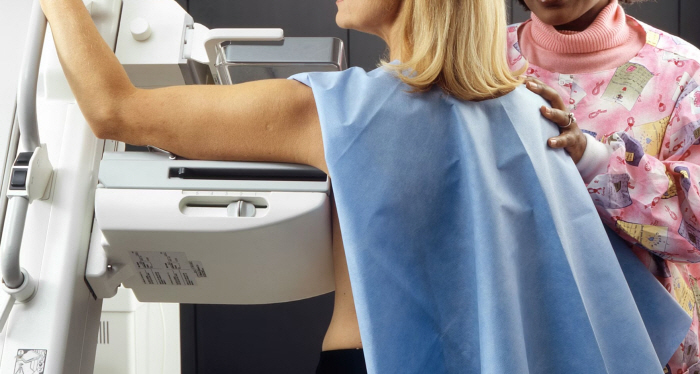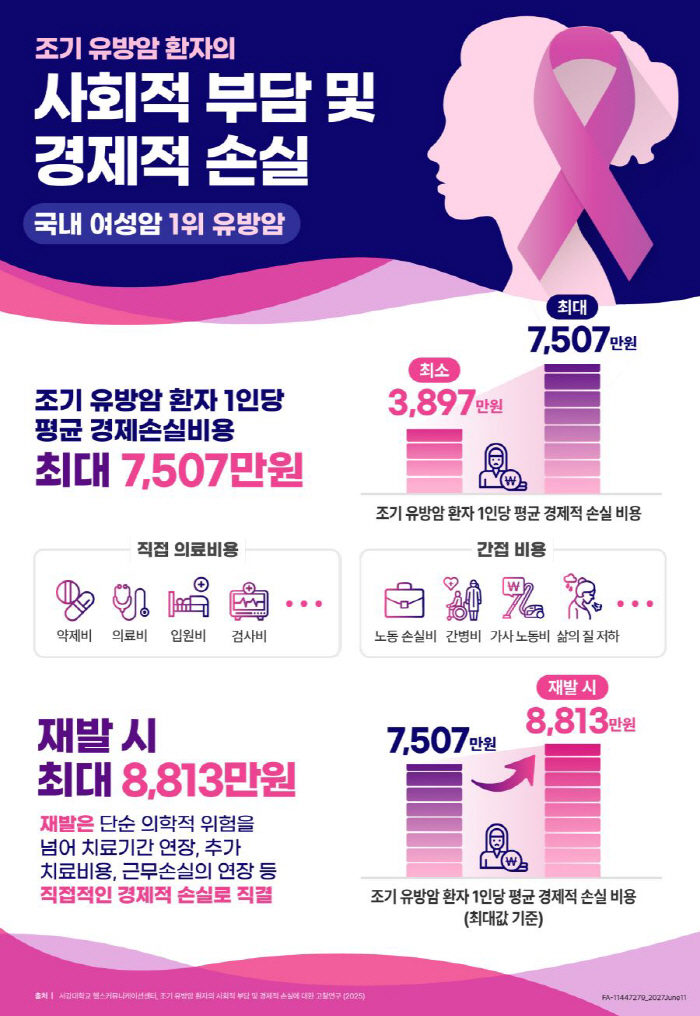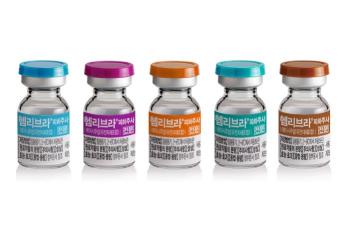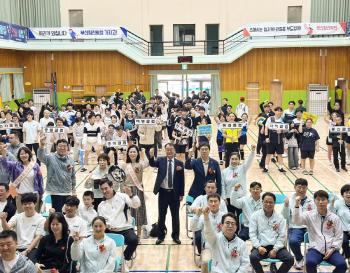Economic loss of up to 75 million won per early breast cancer patient...88 million won for a relapse
Jun 12, 2025
|
In the case of recurrence, it rose to a maximum of 88.13 million won. In addition, it was found that the higher the stage and the lower the quality of life, the higher the economic loss.
Sogang University's Health Communication Center released the results of a review study on 'social burden and economic loss of early breast cancer patients' conducted through research support from Novartis Korea.
This study is a study that systematically analyzes the social, economic and emotional difficulties faced by early breast cancer patients, who account for about 90% of breast cancer patients in Korea, by a research team led by Professor Yoo Hyun-jae at Sogang University's Health Communication Center, and applied a mixed research method that conducts surveys and expert advice together. The results of this study are expected to be used as evidence for policy proposals to prevent recurrence and improve the quality of life of breast cancer patients in the future.
◇The average cost of economic loss per early breast cancer patient is up to 70 million won
In Korea, breast cancer is a cancer that occurs mainly in women in their 40s and 50s who are economically active and play a central role at home, and patients bear overlapping burdens such as treatment, career breaks, and family roles. In this study, 77.4% of early breast cancer patients surveyed were women in their 40s and 60s, 73.3% had children, and 68% belonged to households with three or more people.
According to the study, the average cost of economic loss for early breast cancer patients ranges from a minimum of 38.97 million won to a maximum of 75.07 million won. In addition to direct medical costs, the economic loss calculated in this study is the socioeconomic loss cost of early breast cancer patients, which covers indirect costs such as income loss due to work stoppage, domestic labor loss, child care, transportation, and nursing expenses. This was calculated based on the total cost accumulated by reflecting the period of time each patient actually spent on treatment from less than 6 months (minimum period) to more than 3 years (maximum period).
Looking at the medical factors related to economic costs, the overall cost of economic loss increased when early breast cancer patients experienced recurrence. Early breast cancer patients with recurrence had an average total economic loss cost of about 29 million won higher than patients without recurrence. In particular, the recurrence patient group spent more than 13.3 million won on indirect costs such as productivity and loss of domestic labor compared to the non-recurring patient group, which means that the indirect cost of recurrence patients is about 1.8 times higher than that of the non-recurring patient group. In this study, only early breast cancer patients in stage 1-3 were studied, so considering metastatic breast cancer including stage 4, it is inferred that the socioeconomic loss cost due to recurrence of breast cancer will be greater.
The cost of economic loss also changed depending on the breast cancer stage (stage 1, 2, 3) first diagnosed. The higher the stage, the higher the direct medical cost, as well as the indirect cost. It was found that stage 3 diagnostic patients spent about 24 million won more indirect costs than stage 1 patients and 19 million won more indirect costs than stage 2 patients, and the total economic loss cost (direct medical cost + indirect cost) was found to be about 39.22 million won on average between stage 1 and stage 3, so the higher the diagnosis stage, the higher the cost.
◇About 76.7% of early breast cancer patients are concerned about recurrence
In this study, 'Quality of Life' refers to the degree of overall quality of life that encompasses all physical, emotional, economic, social and spiritual conditions caused by cancer fighting and treatment. The physical function and emotional state of early breast cancer patients were measured, as well as the quality of life encompassing family support, marital relationship, fear of recurrence and treatment, economic burden, difficulty in maintaining work life, and disruption in daily life. As one of the questions that measures your fear of relapse and treatment, are you worried about a recurrence?In response to the question ', 76.7% expressed concern about a recurrence, of which 40.7% answered 'Very yes'.
When 'Quality of Life' was divided into three groups based on the average, the majority (58.7%) of the subjects (low group) specified that the quality of life was low, and other middle group (25.3%) and high group (16%). Looking at the correlation between quality of life and economic cost, it was found that the low-quality patient group spent an average of 10.62 million won higher indirect costs throughout the treatment period than the high-quality patient group. The research team interpreted this as a result of increased productivity losses if there are restrictions on both treatment and work due to the ▲ leave system or jobs that are difficult to use flexible work, and ▲ lack of a care system or emotional support base in the family increased indirect spending such as household expenses.
Professor Park Yeon-hee of the Department of Hematologic Oncology at Samsung Seoul Hospital, who advised the study, said, `Unlike overseas, where the main incidence age group is in their 60s and 70s, breast cancer in Korea is mainly caused by women in their 40s and 50s who play a pivotal role in economic activities and domestic parenting and care, and recurrence affects the home and society as a whole beyond the individual patient.' `It is necessary to examine whether these social implications are not sufficiently illuminated because they are female cancer.'
Professor Yoo Hyun-jae of Sogang University, who led the study, said, `This study confirmed indirect effects such as loss of income from women's career break and loss of housework cost for housewives, in addition to direct medical expenditures for early breast cancer patients"In particular, recurrence is a mechanism that amplifies both emotional and economic shocks, and it is likely to expand to mental health problems such as isolation, depression, and decreased self-esteem in addition to women's career breaks and difficulties in performing roles in the home, so the common opinion of medical experts is that it needs to be viewed as a complex problem."
Meanwhile, there are about 30,000 breast cancer patients in Korea, and about 1 in 5 female cancers occur. The number of young breast cancer patients under the age of 50 is constantly increasing in South Korea, and the incidence rate of premenopausal (usually under the age of 50) is about 46.5%, accounting for nearly half.
89.5% of domestic breast cancer patients are classified as early breast cancer (1st to 3rd stage). Despite the high survival rate, early breast cancer has a 5-year recurrence rate of 17.7%, and there is a difficulty that there is a long-term risk of recurrence up to 20 years or more after treatment.
|
This article was translated by Naver AI translator.















